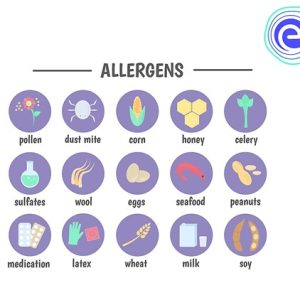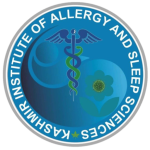Allergy

Allergy
An allergy is a hypersensitive disorder of the immune system. Allergic reaction occurs when a person’s immune system reacts to normally harmless substances in the environment and produce antibodies. Interaction of antibodies with allergens causes allergic symptoms. The substance that causes a reaction is called allergens.
Many allergens are air borne particles like dust mite or pollen which causes symptoms in areas of contact with air like eyes, nose or lungs.
What are the symptoms of an allergic reaction?
Common symptoms of an allergic reaction to inhaled or skin allergens include:
Itchy, watery eyes
Sneezing
Itchy, runny nose
Rashes
Feeling tired or ill
Hives (a rash with raised red patches)
What are the entry sites of allergens?
Allergen enters into the body mainly by inhalation, ingestion, injection and direct skin contact. Main risk factors for Allergy are:
Family history of allergies,
Serum IgE>100 IU/ml before age of 6 years
Animal contact, Dust mite exposure, Passive smoking, Eczema
Small family size, Early use of antibiotics, Western life style, Diet
Exact mode of genetic transmission is still not known but positive family history is the single most important factor to predict the development of allergies.
Why We Get Allergic
The reason why a person gets allergic is mainly two Common Allergens
Dust Mites
Cockroach
Pet Dander
Moulds/Fungus
Pollens
What are the types of allergies?
Allergy related diseases can be classified based on the target organs involved. Some common types are mentioned below.
Nose – allergic rhinitis
Sneezing
Lungs -Asthma
Skin -Dermatitis
Eye -Conjunctivitis
Systemic-Anaphylaxis
Gut -Food allergy
Ear –otitis media


How an allergy is diagnosed?
A thorough history and physical examination should be undertaken by an experienced Allergist.
Allergy skin testing:
Allergy skin test is a confirmatory, highly sensitive, reproducible, rapid and cost effective method to screen existing IgE sensitivities that may be responsible for clinical symptoms.
- Skin surface is cleaned with alcohol and dried naturally Marking is done on the area of skin test site with a pen. Then is the application of a small drop of antigen on the site.
- A sharp instrument (lancet, hypodermic needle) is passed through the drop and the skin is gently lifted, creating a small break in the skin through which the allergen penetrates.
- Interpretation is done after 15 minutes
Factors affecting skin test:
- Age-infancy or old age
- Sex -no difference
- Race-whealing more in blacks
- Circadian rhythm – peaks in late evening
- Seasonal variation – Eg: pollen allergies
- Skin condition-skin eczema
- Other condition-diabetic neuropathy Prerequisites for Skin Testing
- Antihistamines like cetrizine and loratidine, should be stopped at least 5 to 7 days before testing.
- Tricyclic anti depressant (doxepine) and atypical antipsychotic drugs (ex. risperidone, olanzapine, and ziprasidone) should be tapered down, if required, at least 2 weeks before testing. Beta blockers should be stopped in all instances 24 hour before the testing
Book an Appointment
Need to schedule a visit with one of our specialists? It’s easy! Just click on “Book an Appointment” button below.
Book your appointment online today and get the care you need from our qualified healthcare professionals.
Contact Info
Address
24-A Shah Complex, opposite OPD gate of SMHS Hospital, Karan Nagar, Srinagar, Jammu and Kashmir 190010
Phone
94190 07775 | 01942504864
lungkashmir@rediffmail.com
